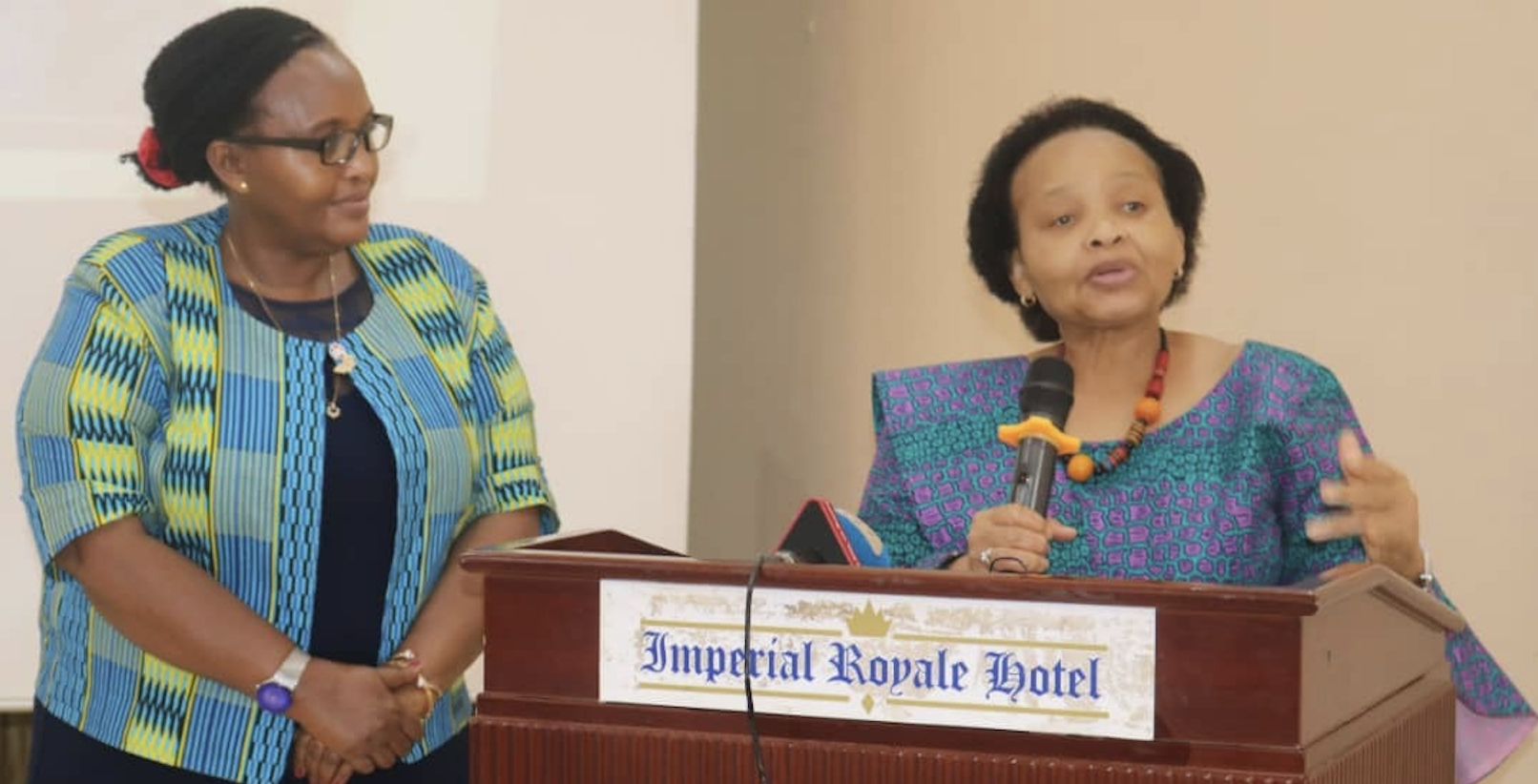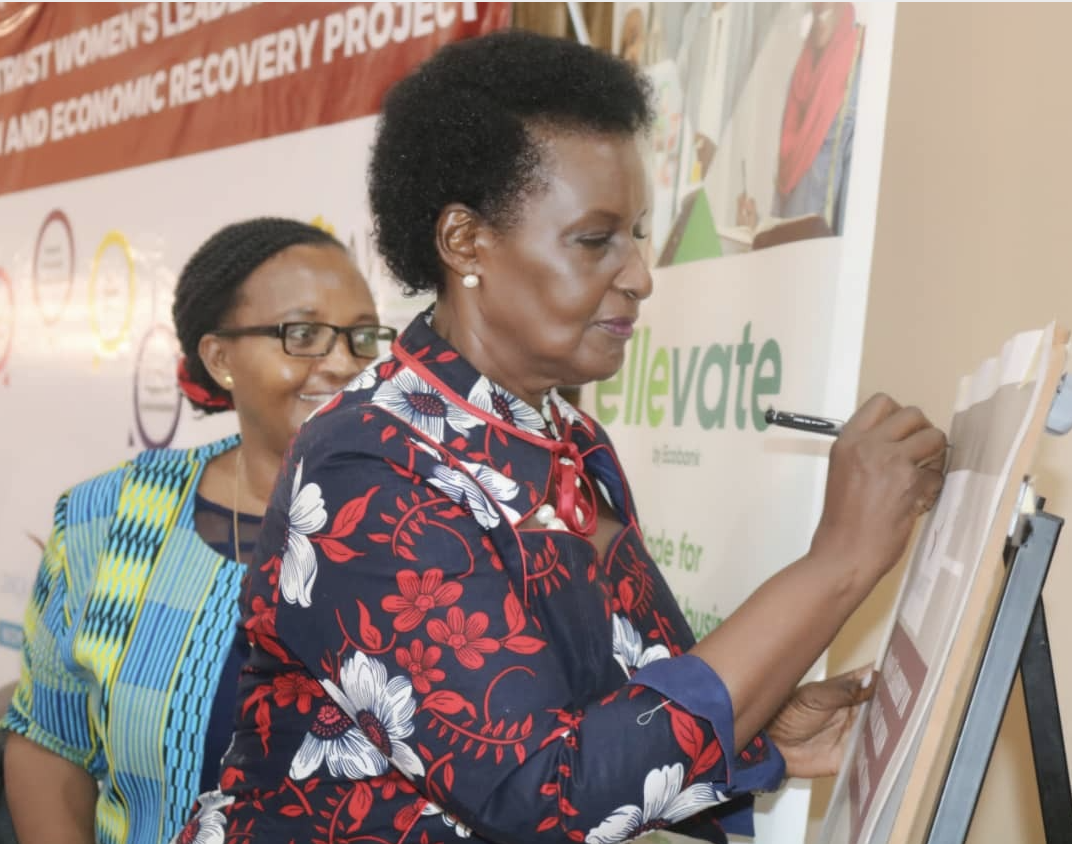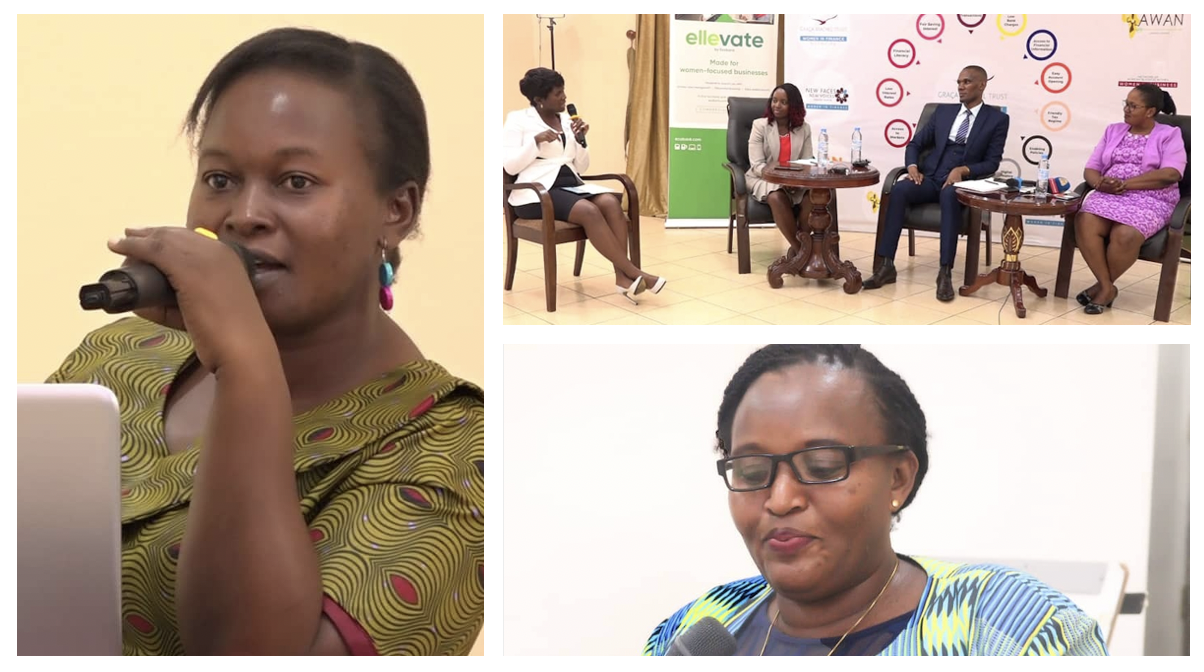The Graça Machel Trusts’ Uganda Chapter, which comprises women networks and partners, recently launched Gender Mainstreaming Standards for the COVID-19 Women’s Leadership for Financial Inclusion (WLFI) and Economic Recovery project.
The network members from the Uganda chapter convened at the Imperial Royale Hotel in Kampala, Uganda on the 19th of May 2022, where women leaders and stakeholders presented Gender Mainstreaming Standards which aimed to assist women to understand and embrace the role of building spaces for adopting the standards and their subsequent application in different business sectors. This aligns with the Trusts’ primary goal of building and institutionalizing a collective of African women leaders as Expert Women Leaders and Leading Women’s Networks to influence policy actions that promote inclusive economic recovery in Africa through women’s financial inclusion.

H.E Lulama M. Xingwana Lulu, the Ambassador of South Africa to Uganda, and Dr. Theopista Sekitto Ntale
Country Director New Faces New Voices.
The event attracted a cross-section of women leaders and a handful of men from civil society, diplomatic missions, and critical financial and tax institutions. H.E Lulama M. Xingwana Lulu, the Ambassador of South Africa to Uganda, was the guest of honor at the event and she delivered the keynote speech. She commended the important work of Graça Machel Trust on the continent and advised, “In addition to financial inclusion, one of the key issues Graça Machel Trust should look at is land ownership for women because that will allow women to produce coffee and other important cash crops that can boost their economic status and that of their families,” she remarked.
Hon. Emilia Kyambadde, the former Minister of Trade and current Presidential Adviser on Trade and Industry, addressed the participants about women and trade and highlighted issues of the newly launched Parish Development model in Uganda. “Who do we expect to make it work if not ourselves. We must link these standards to the parish model, link up with local government officials and allow them to take us to the women we want to empower but who have no access to our spaces,” she said.

Hon. Emilia Kyambadde, the former Minister of Trade and current Presidential Adviser on Trade and Industry
Presenting the initial findings in the Women’s Leadership for Financial Inclusion (WLFI) and Economic Recovery research, Dr. Sarah Hasaba, the lead researcher on the project, emphasized the need for women to acquire relevant skills to enable them to negotiate challenges and also take advantage of technological advancement. “According to the research findings,” she said, “although women have embraced technology, they continue to struggle with digital skills. Financial inclusion cannot work well where skills have not been imparted.” She called on institutions and government to actively participate in empowering women.
Other distinguished guests present at the event and who addressed the participants included the Chairperson of the Uganda Equal Opportunities Commission, Hon Safia Nalule, who touched on the important role of research as a determinant factor of good policy development practice. She shared research documents from her own docket which she said could be useful for participants in different spaces of women’s rights and inclusion.

Participants of the Gender Mainstreaming Standards launch- Kampala, Uganda.
Participants had the privilege to learn from Mr Abel Mwesigye the Chief Executive Officer of Kampala City Traders Association (KACITA). He said, “COVID-19 struck all of us, but women have shown the highest level of resilience in continuing to conduct business, from the market to arcades and other big businesses. They have motivated us, the men, to come back to business.” He added that, “business development models miss out a lot when not working with women who are directly in spaces that these policies impact. We limit ourselves to high-end spaces which might not offer much insight necessary for policy formulation.”
Dr Maggie Kigozi a consultant at the United Nations Industrial Development Organisation and Former Executive Director of the Uganda Investment Authority, Ms Grace Muliisa – Managing Director and Chief Executive Officer of ECO Bank Uganda Limited were also present. Ms Grace Musila brought warmth to the room when she said no woman should be reminded to help other women. “Where there is a woman, I always stretch my hand,” she shared.
This project comes at the most appropriate time for Uganda when the Government is also launching the Parish Development Model under the Uganda National Development Plan. This is the last mile strategy for service delivery by the Government of Uganda to improve the incomes and welfare of all Ugandans at the household level. The government would therefore benefit a lot from implementing some of the gender mainstreaming standards suggested by the project.
Compiled by Hilda J. Twongyeirwe, Women in Media Network (WIMN) Uganda










 The Trust supports and mobilises civil society networks on issues of ending child marriage, ending violence against children, ending female genital mutilation and promoting children’s rights, to carry out advocacy and action across Africa. Special focus is placed on Malawi, Mozambique, Tanzania and Zambia where child marriage continues to be a problem largely driven by poverty, gender inequality, harmful traditional practices, conflict, low levels of literacy, limited opportunities for girls and weak or non-existent protective and preventive legal frameworks.
The Trust supports and mobilises civil society networks on issues of ending child marriage, ending violence against children, ending female genital mutilation and promoting children’s rights, to carry out advocacy and action across Africa. Special focus is placed on Malawi, Mozambique, Tanzania and Zambia where child marriage continues to be a problem largely driven by poverty, gender inequality, harmful traditional practices, conflict, low levels of literacy, limited opportunities for girls and weak or non-existent protective and preventive legal frameworks.




 Education is a fundamental right for all children, which is also a vehicle for social, economic and political transformation in communities, countries and the African continent at large. Recent studies indicate a lack of progress in some of the critical commitments aimed at improving education quality, access, retention and achievement, particularly for girls. In most African countries, girls may face barriers to learning, especially when they reach post-primary levels of education. By implementing multi-dimensional approaches to education which includes core education, personal development, life skills and economic competencies, the Trust partners with funding partners, governments, civil societies and the private sector to improve education access.
Education is a fundamental right for all children, which is also a vehicle for social, economic and political transformation in communities, countries and the African continent at large. Recent studies indicate a lack of progress in some of the critical commitments aimed at improving education quality, access, retention and achievement, particularly for girls. In most African countries, girls may face barriers to learning, especially when they reach post-primary levels of education. By implementing multi-dimensional approaches to education which includes core education, personal development, life skills and economic competencies, the Trust partners with funding partners, governments, civil societies and the private sector to improve education access.

 The Nutrition and Reproductive, Maternal, New-born, Child and Adolescent Health and Nutrition, (RMNCAH+N) of the Children’s Rights and Development Programme aims at promoting the Global Strategy for women, children and adolescents’ health within the Sustainable Development Goals (SDG) agenda. The strategy emphasises on the importance of effective country leadership as a common factor across countries making progress in improving the health of women, children and adolescents.
The Nutrition and Reproductive, Maternal, New-born, Child and Adolescent Health and Nutrition, (RMNCAH+N) of the Children’s Rights and Development Programme aims at promoting the Global Strategy for women, children and adolescents’ health within the Sustainable Development Goals (SDG) agenda. The strategy emphasises on the importance of effective country leadership as a common factor across countries making progress in improving the health of women, children and adolescents. Through its Early Childhood Development (ECD) plan, The Trust will seek to put into action the new science and evidence Report that was presented by Lancet Series on Good and early development – the right of every child. This will be achieved by mobilising like-minded partners to contribute in the new science and evidence to reach all young children with ECD. The Trust’s goal is to be a catalyst for doing things differently, in particular, to rid fragmentation and lack of coordination across ECD sectors. In response to evidence showing the importance of political will in turning the tide against the current poor access and quality of ECD. Even before conception, starting with a mother’s health and social economic conditions, the early years of a child’s life form a fundamental foundation that determines whether a child will survive and thrive optimally.
Through its Early Childhood Development (ECD) plan, The Trust will seek to put into action the new science and evidence Report that was presented by Lancet Series on Good and early development – the right of every child. This will be achieved by mobilising like-minded partners to contribute in the new science and evidence to reach all young children with ECD. The Trust’s goal is to be a catalyst for doing things differently, in particular, to rid fragmentation and lack of coordination across ECD sectors. In response to evidence showing the importance of political will in turning the tide against the current poor access and quality of ECD. Even before conception, starting with a mother’s health and social economic conditions, the early years of a child’s life form a fundamental foundation that determines whether a child will survive and thrive optimally.